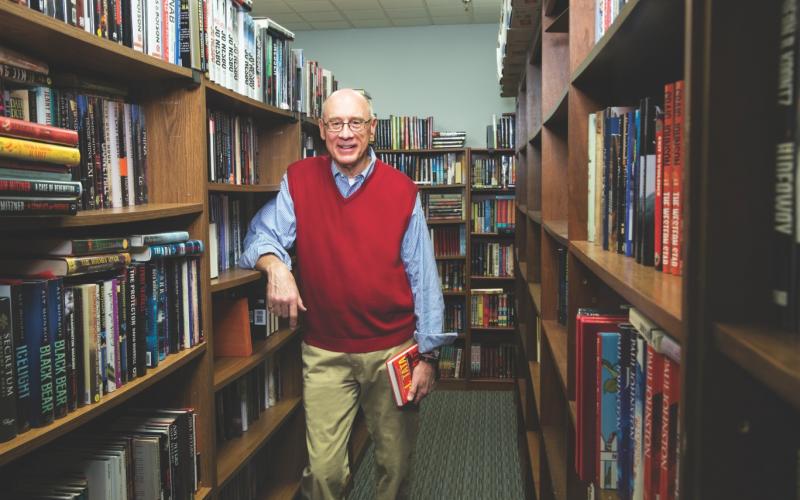Mystery Mike, Rare Book Dealer

Mike Bursaw
Like a good detective, Mike Bursaw keeps a low profile. No fancy storefront. No glitzy marketing. Tall, lean, clean-cut, he blends into a crowd with his crisp khakis, solid sweaters, and sensible shoes.
But lovers of suspense fiction know “Mystery Mike,” 67, is a standout—one of the nation’s premier book dealers in mysteries and thrillers. For more than 50 years, he has found a way to survive in the business when so many bookstores have shuttered. He’s the man to call should you need, say, a first edition of Sue Grafton’s B is for Burglar ($1,000). Bursaw’s Carmel store has an inventory of more than 8,000 volumes. At home, he has downsized his personal library from 11,000—“It was overwhelming”—to a svelte 4,000.
“He’s totally dedicated to the mystery fiction world, not only as a bookseller but as a fan,” says George Easter, editor of Deadly Pleasures Mystery Magazine. “He’s just one of the nice guys. He’s not one to toot his own horn.”
Born in Minneapolis, Bursaw broke into the book business at age 15 when a wholesale distributor hired him to sweep floors and stock inventory. “I saw an ad in the paper and went down and applied,” he says. “But the owner didn’t hire high school kids. My comment to him was, ‘Try one.’ He asked how soon I could start. I said, ‘Five minutes from now. I’ll call home and tell them I’m not going to be there for dinner.’”
In 1986, Bursaw opened Mystery Mike’s, which he runs simultaneously with a stationery shop. Like a private investigator, he never knows what adventure the next phone call will bring. Often, a book-lover has died and left a vast collection that the family hopes to sell.
“It’s book treasure-hunting,” Bursaw says. “You don’t want to have expectations too high. You go in and you never know. It’s fun.”
If the sale looks promising, Bursaw personally sorts through the volumes, scouting for first editions and author signatures. He stacks books in piles by approximate value, then makes an offer.
Sometimes, he buys big. Four thousand volumes from a retired Indianapolis librarian. Other times, he buys huge. In 2013, he purchased 49,000 books from a bibliophile in Madison, Wisconsin, and hired half a high school hockey team to haul the bounty. One recently acquired treasure, a handwritten James Ellroy manuscript of Because the Night with corrections, will go to market for $7,500.
Relatives often have no idea of a collection’s worth. “You can cheat people blind if you want to,” Bursaw says. “But how do you look in the mirror if you do that kind of stuff?”
Bursaw gives back to the mystery community by volunteering at Bouchercon, its massive annual conference. He co-chaired the Indianapolis convention in 2009, cowrote a best-practices guide, and has served as national treasurer.
“Mike is a behind-the-scenes guy who is like a rock for the organizers,” says Steele Curry, a Calgary collector with 12,000 first editions. “The fact that the convention is still solvent and has avoided any kind of financial difficulties over the years is partially due to Mike.”
At the most recent Bouchercon, in Toronto, Bursaw manned his table in the book room, where he greeted old friends and new customers. One man wanted a signed Reed Farrel Coleman. Another coveted a first edition of Sara Paretsky’s Indemnity Only, but settled on a second edition, more in her price range at $49.
Then Sara Paretsky herself showed up. She signed the first edition, bumping its value up to $500. Five minutes later, a Canadian collector scooped it up, along with a $200 first edition of Louise Penny’s A Fatal Grace. Bursaw grins: “That was the perfect storm.”
Bookselling has changed a lot in the past 50 years, from the arrival of megastores to Amazon. Bursaw attributes his longevity to remaining flexible. He now focuses on rare books and collectibles. Quality over quantity. Though he may sell his greeting-card business, he has no plans to stop selling books.
As for Bursaw’s own reading taste—he devours 80 titles a year—he prefers hard-boiled crime, like Michael Connelly, to cozies about tea shops and cats. The book dealer can’t imagine why his own life is worth any kind of story. The plot is too simple: “He came. He saw. He sold.”





